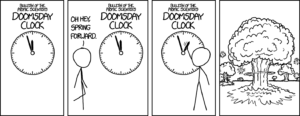This month’s installment of Inkstick’s culture column, The Mixed-up Files of Inkstick Media (inspired by From the Mixed-up Files of Mrs. Basil E. Frankweiler), where we link pop culture to national security and foreign policy, combines two cultural icons: The Doomsday Clock and Buzzfeed listicles. In honor of the Clock’s 75th anniversary and of viral content like “Pick 7 Junk Foods and We’ll Tell You What % Trash You Are,” we bring you nine times celebrities or pop culture have referenced (either appropriately or inappropriately) the Doomsday Clock.
The Doomsday Clock turned 75 this year! Is it exciting or haunting that the clock created by The Bulletin of Atomic Scientists — and designed by Martyl Langsdorf, meant to signal how close humanity is to its destruction — is still around three-quarters of a century later? Whatever it is, Hat and Beard Press has published an entire book on the visual icon. The clock’s time was originally set by Eugene Rabinowitch relative to the state of world affairs vis-a-vis nuclear weapons but is now set by the Bulletin’s Science and Security Board. Over the last several years, however, the Bulletin has expanded its focus area and Clock time calculations to include the threats of climate change and disruptive technologies. Most recently, the Bulletin set the Clock’s time in January of this year to 100 seconds to midnight. In March 2022, the Science and Security Board released a statement condemning Russia’s invasion of Ukraine but kept the time at 100 seconds to midnight.
Memes and escapism are great, but when we do our occasional check-ins with reality, we find ourselves feeling trapped by the actions and decisions of world leaders we’ll never even meet.
As I know many of my colleagues have also experienced, the invasion of Ukraine and open threats about possible nuclear weapons use incited a rush of texts, DMs, or phone calls from friends and family asking about my takes on the possibility of nuclear war instead of the usual other way around in which I squeeze as much info as possible into a single breath before they say “Oh ok cool” while their eyes pleaded “Please stop.” Although the Ukrainian conflict is still ongoing, I’ve collected a variety of times pop culture has referenced the Clock as an attempt at curating some respite and levity for the warm glow of summer break (whether we ourselves get one or not). After all, Gen Z’s go-to coping mechanism is turning everything into a joke or a meme. So, allow this elder-Zoomer to take you back a decade or so into the era of Buzzfeed listicles littering your Facebook feeds next to 20 invites a day asking to help your friends’ online farms out.
In the 2017 Justice League movie, while playing the role of Batman, Affleck says, “We tend to act like the Doomsday Clock has a snooze button.” Though the pun has a modicum of “funny,” for those who actually get what the Doomsday Clock is, then it’s obvious why a “snooze button” isn’t quite what we’re looking for here. It also seems to be mistaking the Doomsday Clock for an alarm clock rather than a countdown. My suggestion to Hollywood and Affleck for any future lines pertaining to the Doomsday Clock and snooze buttons: Make Ben, as a disheveled Bruce Wayne, hold an absurd amount of Dunkin’ Donuts coffee while wanting nothing more than to escape the paparazzi and caffeinate after a night of crime-fighting in peace instead. (If you don’t know what I’m talking about then just Google “Ben Affleck Dunkin’ Donuts.”)
Call it a Freudian slip? Boris Johnson on Nov. 1, 2021 during the opening ceremony for COP26, a UN Climate Change Conference of world leaders, said “It’s one minute to midnight on that Doomsday Clock, and we need to act now!”
To give credit where credit is due, Johnson’s application of the Doomsday Clock with respect to climate change was in line with the Bulletin’s incorporation of additional looming existential threats to humanity, such as the very topic of the COP26 conference. What he got glaringly wrong, however, is the time. During Johnson’s speech at COP26, the Clock was then set at 100 seconds to midnight, not 60 seconds. But given that the UK is one of the nine countries possessing a nuclear arsenal, could this perhaps have been a subtle warning? Probably not. But the Doomsday Clock at the time of publishing this is still set at 100 seconds to midnight as announced back in January of this year.
The physicist and former member of the Bulletin of Atomic Scientists’ Security Board perhaps most known nowadays for being portrayed in a biopic by heartthrob Eddie Redmayne, said at the 2007 event to announce the Doomsday Clock’s time: “We have a duty to alert the public to the unnecessary risks that we live with every day, and to the perils, we foresee if governments and societies do not take action…” That year, Hawking also revised a previous personal prediction of a catastrophic event wiping out humanity from happening within the next 1,000 years down to within the next 100 years. Oof.
Setting aside the sit-com’s sudden cancellation yet greenlight for a spin-off about the ONLY non-Asian main character, Kim’s Convenience is a modern staple of Asian-centered, Western-made media about a Korean-Canadian family who owns (you guessed it) a convenience store.
After an entire first season of obvious mutual interest between characters Jung Kim, played by Simu Liu, and Shannon Ross, played by Nicole Power, the first episode of Season Two cuts to a scene of Shannon asking Jung what his Friday night plans are, only to reveal she’s got date night with her then-boyfriend Alejandro so needs Jung to close the store that night instead of her. With Jung clearly misled in the beginning of the exchange, co-worker Arnold “Kimchee” Han, played by Andrew Phung, goes “Jung/Shan Doomsday Clock moved one minute closer to midnight.” Kimchee’s line is yet more proof of how the Clock has entered common vernacular to refer to an irreconcilable end to something. Even the Bulletin agrees.
Seven-member K-pop idol group Bangtan Sonyeondan or “BTS” have had a few encounters with nuclear references and the Doomsday Clock. For example, in the Jan. 24, 2020 episode of Jimmy Kimmel Live!, the late-night TV host suggested that a better way to raise awareness about our being “on the verge of extinction” is to make a live television event about it (though perhaps we ought first to cope with the death of TV by streaming platforms)! Thus, he showcased musical guests Post Malone and BTS in a trailer for a “Rockin’ Doomsday Eve” event that also featured Kim Jung-un. The trailer even had a voiceover with the line, “As the Clock strikes midnight, the ball drops on everyone!”
Alternatively, BTS themselves indirectly reference the clock in their song “Zero O’Clock” on their 2020 album “7.” In their eyes, midnight is hopeful and a time for a new start no matter how bad the previous day was:
“Are you going to be happy?
Are you going to be happy?
Turn this all around
When everything is new, zero o’clock”
Aside from the Doomsday Clock, BTS has dipped its toes in speaking out politically on occasion, even going before the UN General Assembly to advocate for greater understanding both within and across borders as part of their “Love Yourself” era. And more recently, they recorded a special performance of their English single “Permission to Dance” at the UN headquarters in New York in 2021. So, if anyone has connections to their management company Big Hit, let me know so I can try and meet them (fangirl squeal), and then convince them to make their next address to the UN focus on worldwide nuclear disarmament.
In his 1987 novel The Tommyknockers, King writes:
“The Mideast was getting ready to explode again, and if there was shooting this time, some of it might be nuclear. The Union of Concerned Scientists, those happy folks who kept the Black Clock, had advanced the hands to two minutes to nuclear midnight yesterday, the paper reported.” (As opposed to “those happy folks” at The Bulletin of Atomic Scientists based in Chicago, IL who keep the Doomsday Clock).
The Tommyknockers was one of King’s dips into the realm of science fiction writing featuring a small town in Maine whose populace is suddenly affected by the unearthing of a spacecraft in their nearby woods. And, although King is on record as saying The Tommyknockers is “an awful book” but has potential if rewritten to half its original 588-page length, themes throughout the story, such as the dangers of unchecked technological development or certain imagery used in the story that pulls from historical data on the effects of ionizing radiation — in addition to the homage to the Doomsday Clock — seem to be in general alignment of the spirit to The Bulletin’s work.
- Linkin Park’s Minutes to Midnight (2007) album
Nothing is funnier to me than looking back on my days as a 12-year-old despondently listening to this album on my iPod shuffle. At the same time, on the bus ride home, thinking I knew what depression was when, in reality, my greatest struggle of the time back then was missing chicken patty day in my school cafeteria. This is for all my fellow 2007 prepubescent emo baddies out there. If you feel me, then don’t forget to pour one out for our man, Chester. RIP.
Linkin Park’s third studio album marked a distinct departure from their prior two albums. In honor of that, lead singer Chester Bennington suggested the title “Minutes to Midnight” for the album after having recently binged a few documentaries about the Bulletin’s Doomsday Clock. He said:
“From that perspective; midnight is the end of the world as we know it. That’s a little dreary for me, but I thought it worked. The fact that the album is so different from the previous records and that we were more mature and embarking on a new era seemed to fit well with the title. I think the title really captured how we were feeling and where we were going in so many different ways.”
- XKCD Comics
XKCD is a webcomic started by former NASA scientist Randall Munroe. His panels have always been the pinnacle of comedy for me, merging niche scientific knowledge and inside jokes with pop culture. His comics took off to the point that readers began sending him outlandish questions asking for Mythbusters-esque answers based on science. Hence, his side blog series “What If?” has even been adapted into two books. To quote Randall: “After a power outage at the Bulletin of Atomic Scientists, the new Digital Doomsday Clock is flashing 00:00, and mushroom clouds keep appearing and then retracting once a second.”
Not long after beginning his new role as the host of The Late Show on Jan. 28, 2016, Stephen Colbert included a shout-out to the Bulletin’s announcement for the Doomsday Clock’s time setting that year at three minutes to midnight, saying “[The Doomsday Clock] is the only clock more terrifying than the one that wakes you up in the morning.” (Are you reading this one, Ben?). Colbert continued, “Three minutes: Not good. Three minutes only leaves you enough time to brush your teeth and throw on last night’s pants before the world ends,” he said.
Trying to pivot, he continues, “Now the end of the world is scary, admittedly, but I just want to remind everybody that Doomsday — the Clock — is just based on tensions between people. And we can all do something to reduce tensions and help move the Clock back next year.” (Are you reading this part, Putin? Probably not but one can only hope…) After which he encouraged everyone in his studio audience, and everyone watching at home, to “hug it out. It’s about love.” *cue the collective cooties-phobic middle schooler “EWW!”*
“Because we’re only here together on this planet for the blink of an eye,” Colbert said. “And that was beautiful, what you just did. And now that we’ve made an intimate human connection, even if we don’t affect the Doomsday Clock — I can now move the Late Show Orgy Clock to one minute closer to midnight.”
Ignoring the ooey-gooey cheesiness of it all in Colbert’s bit back in 2016, I moved him up several ranks into the number one spot because I think the sentiment of his monologue at its core is an important reminder for us all given the state of world affairs right now. As my fellow columnist Lovely Umayam put it on Instagram, “we now have clear insight into how nuclear weapons work: they are used to coerce countries and is not a tool of deterrence or defense.” The conflict between Ukraine and Russia is the first time people around my age and younger must face the stark reality of possible nuclear war. Our parents and grandparents made it through the initial Cold War, and many fought vigorously for peace and disarmament, with the historic Freeze March having happened precisely 40 years ago earlier this month.
Many ongoing conflicts and rising tensions across the globe are not as immutable as they may appear, though they are overwhelming. Ukraine is no different. Memes and escapism are great, but when we do our occasional check-ins with reality, we find ourselves feeling trapped by the actions and decisions of world leaders we’ll never even meet. Sometimes the best we can do is focus on those we have met in our lives. Gen Z and pop culture has amassed a level of power and influence like never before with the widespread use of social media. Take the K-pop stans who reserved tickets for a Trump rally en masse to be no-shows and leave the former president with a widely empty venue. Mass action such as that can have an impact when done intentionally and showcases the powerful potential in the blending of pop culture, meme-y comic relief, and civic engagement. How might my generation create a repeat of the 1982 Freeze March in a 2022-world full of GIFs, dark anti-humor, and virtual gatherings? Maybe a subreddit has the answer…
Acknowledgments: Shoutouts to Robert K. Elder and Lorene Yue formerly at The Bulletin of Atomic Scientists for their help in compiling examples for this listicle. Many more were cut for the sake of length from these rankings, but the author nonetheless appreciates the continued enabling from both Inkstick and The Bulletin to justify her (over)consumption of social media and pop culture through continued works like this for the column.















